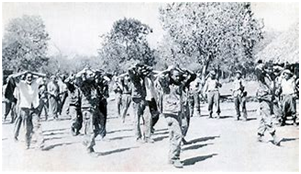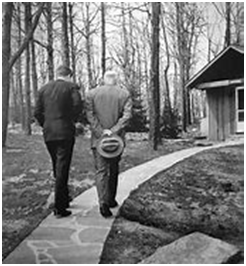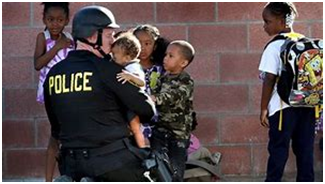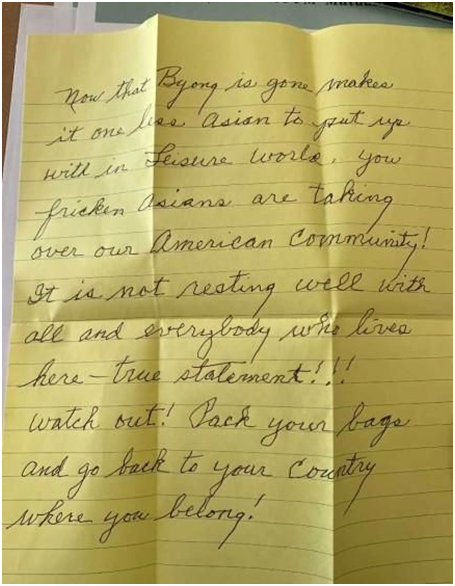
“A Piece of My Mind”
April 2021 Newsletter
Advancing Christian Faith and Values,
Defending Religious Liberty for All,
Supporting Civility and the Common Good
through Preaching, Teaching, Writing, Activism and Reasoned Conversations

 Our Easter Hope – Resurrection to New Life
Our Easter Hope – Resurrection to New Life
We’ve started a “Monarch Butterfly Nursery” at home! My wife diligently cares for the butterflies as they go through their stages. Their larva stage is a time to eat and nothing else. Then they are enclosed for several days at the chrysalis stage. From that, they burst forth in beauty and are soon ready to fly.
It’s a beautiful picture of resurrection. Our earthly bodies, like Jesus’ body, were made for our present existence. When Jesus returns, we will break forth from the grave with beautiful resurrection bodies, as Jesus did—he “died for our sins…was buried…and was raised the third day” in glory.
“When the perishable has been clothed with the imperishable, and the mortal with immortality, then the saying that is written will come true: ‘Death has been swallowed up in victory’.” – 1 Corinthians 15:3-4, 42-44, 50-54
April, 1961 – The “Bay of Pigs” Invasion
Sixty years ago this month, on April 17, 1961, 1500 Cuban exiles opposed to Fidel Castro’s rule (which began in 1959) landed at the Bay of Pigs on the SW coast of Cuba with the hope of defeating defenders and generating support from islanders for Castro’s overthrow. The planning began during the Eisenhower administration and continued when John Kennedy took office in January 1961. Finally, the invasion was approved by the new president.
 Victory was not to be. Within three days the invaders were defeated and most were captured. Kennedy had cancelled plans for air cover, dooming the operation.
Victory was not to be. Within three days the invaders were defeated and most were captured. Kennedy had cancelled plans for air cover, dooming the operation.
The invasion was a total failure and a deep embarrassment to the new president and his administration. It solidified Castro’s grip on the nation and led Cuba to look to the Soviet Union for future support.
Over 100 insurgents were executed. In December 1962 most that remained were released in exchange for $53 million in food and medicine, the money raised from companies and private donations. About 1000 family members also left Cuba with them.
 Kennedy took full responsibility for the failure. Especially poignant, two days after the collapse of the invasion Kennedy invited Dwight Eisenhower to Camp David to get, as Kennedy later told the press, “the benefit of his thoughts and experience.”
Kennedy took full responsibility for the failure. Especially poignant, two days after the collapse of the invasion Kennedy invited Dwight Eisenhower to Camp David to get, as Kennedy later told the press, “the benefit of his thoughts and experience.”
It was quite an encounter: a new president who just lost a skirmish involving 1500 invaders talking with a former president who once planned and executed the greatest invasion in the history of the world—D-Day, June 6, 1944.
Recommended reading: Three Days in January by Bret Baier (HarperCollins, 2017)
Bible Insight – “The Perseverance of the Saints”
To my non-Christian Readers: This “Insight” might seem like an in-house religious thing, but please give it a read. Christians can be cantankerous. But we can and should instead be thoughtful and do a better job explaining who we are and living by what we believe. No Christian is without sin, but sin is nonetheless incompatible with faith in God and needs to be remedied through reconciliation with God and others. Forgive us our failings!
To my Christian Readers: This topic is divisive. But we would all do ourselves a favor by understanding it better and not misstating the other side. In heaven we’ll understand better. Most important, we will have persevered!
The doctrine of “Perseverance of the Saints” (those truly converted to Jesus will never completely fall away but will be saved in the end) could also be called “The perseverance of GOD for the saints” (Philippians 1:6 – “He who began a good work in you will carry it on to completion until the day of Jesus Christ.”).
Jesus gave support for this doctrine in his word about the sheep he chooses and cares for. In John 10:25-30 Jesus taught on divine “Keeping Power”:
v. 28 – “They [his sheep] shall never [ou mé—double negative, a powerful negation] perish; no one can snatch them out of my hand.”
v. 29 – “My Father, who has given them to me, is greater than all;
no one can snatch them out of my Father’s hand.”
v. 30 – “I and the Father are one.” (In purpose? In essence? Both? If in purpose, Jesus and his Father are working purposely together to preserve his sheep.)
A critic of the doctrine may respond, “Yeah, but you can snatch yourself out of Jesus’ hand!” But if so, this means we must be greater than Jesus and his Father, whom Jesus just said “is greater than all” (including you and me).
Wayne Grudem (Bible Doctrine, p. 337) questions this self-snatching: “But that seems to be quibbling over words—does not ‘no one’ also include the person who is in Christ’s hand? Moreover, we know that our own hearts are far from trustworthy. Therefore, if the possibility remained that we could remove ourselves from Christ’s hand, the passage would hardly give the assurance that Jesus intends by it.”
After all, the biggest threat to one’s perseverance is not what someone else, even the Devil, might try to do. The biggest threat comes from our own selves.
There is one other important truth in this shepherd/sheep motif:
v. 27 – “My sheep listen to my voice; I know them, and they follow me.”
(Genuine sheep obey their shepherd—a key point in perseverance.)
What is the difference between “perseverance” and “eternal security”?
“Eternal security” is a popular way of saying we cannot forfeit our salvation. But I don’t like the phrase and I think it should be abandoned. Here’s the problem:
“Eternal security” is encompassed in the word “Perseverance.”
But “Perseverance” is NOT encompassed in the phrase “eternal security”.
Others characterize this teaching as “Once saved, always saved” or “Once in grace, always in grace” (a critic said: ”If you get out of grace, you’re a disgrace!”).
Eternal security can become a sort of spiritual fire insurance or a “get out of jail pass” doctrine, separating our responsibility from God’s promise. “Perseverance” in contrast stresses our responsibility and describes the faithfulness of a true believer.
Many Christians believe it is possible for someone who was once genuinely converted to Jesus to so fall from the faith as to forfeit salvation and be lost in unbelief once again. A popular term for this falling away is “backsliding”.
“What’s happened to Joe? I haven’t seen him at church for months!” “Joe? Oh, Joe backslid—he’s living in sin again.” (See “spiritual failures” below.)
How can Hebrews 6:4-9 be understood relative to “perseverance”?
4 It is impossible for those who have once been enlightened, who have tasted the heavenly gift, who have shared in the Holy Spirit, 5 who have tasted the goodness of the word of God and the powers of the coming age 6 and who have fallen away, to be brought back to repentance. To their loss they are crucifying the Son of God all over again and subjecting him to public disgrace.
Option #1 – It speaks of a false convert who renounces the faith. At best, he only had a “near conversion” experience and exposure to the work of the Holy Spirit. For this person to fall away from the four spiritual privileges mention in Hebrews 6:4-5 is to put oneself beyond the possibility of true repentance.
My problem with this option is this: if found in any other biblical context, the four spiritual privileges would certainly be seen, especially when all together, as indicators of a full and genuine conversion experience.
Option #2 – It describes a true believer who falls away. If this proves we can lose our salvation, it proves too much. Those who believe one can lose salvation certainly also believe that one who is saved and then lost can be saved again.
Some may argue that this person has committed “The Unpardonable Sin”, but I don’t think so. Jesus explained “The Unpardonable Sin” differently (Matthew 12:22-32).
Option #3 – This is a hypothetical case followed by a reassurance (my preferred option). What if a truly converted person did indeed fall away? Then repentance and return would never be a possibility. But “even though we speak like this, we are confident of better things in your case—things that accompany salvation” (6:9). Hence, the scenario is hypothetical. See 1 Corinthians 15:14-20 for a similar hypothetical scenario followed by a reassurance.
What about those sticky “conditional” scriptures?
Don’t they disprove “perseverance”?
“He who stands firm to the end will be saved.” (Matthew 24:13)
“By this gospel you are saved, if you hold firmly to the word I preached to you.” (I Corinthians 15:2)
“…if you continue in your faith, established and firm, not moved from the hope held out in the gospel.” (Colossians 1:23)
No, they don’t disprove “perseverance.” Actually, they reinforce it. But they do disprove “eternal security” as it’s often depicted. “Perseverance” means steadfastness—to the end. Conditional statements must be taken seriously. Compare the seed that falls on the pathway versus the seed that falls on good ground (next point).
The Parable of the Sower, the Seed, and the Soils (Matthew 13:1-23)
Three of the “soils” that represent those to whom the message of God’s kingdom has come are described in Matthew 13:20-23 –
20 The seed falling on rocky ground refers to someone who hears the word and at once receives it with joy. 21 But since they have no root, they last only a short time. When trouble or persecution comes because of the word, they quickly fall away. 22 The seed falling among the thorns refers to someone who hears the word, but the worries of this life and the deceitfulness of wealth choke the word, making it unfruitful. 23 But the seed falling on good soil refers to someone who hears the word and understands it. This is the one who produces a crop, yielding a hundred, sixty or thirty times what was sown.”
Only the good soil that is fruitful describes Jesus’ true follower.
Genuine believers may have significant spiritual failures.
Any realistic Christian knows how quickly and easily (or over time) spiritual failure can come. What counts is how we respond to failure. Not by denying it or accepting it, but by confessing it and forsaking it (1 John 1:5-10).
Few have failed worse than the foremost apostle, Simon Peter (Luke 22:31-34):
(1) Jesus’ warning – “Simon, Simon, Satan has asked to sift you as wheat.”
(2) Jesus’ assurance – “But I have prayed for you, Simon, that your faith may not fail.” (Does Jesus’ Father in heaven hear the prayers of his Son?)
(3) Promised recovery – “When you have turned back, strengthen your brothers.”
(4) But Simon is self-confident still – “I am ready to go with you to prison and to death.”
(5) Simon’s utter failure – he disowned Jesus three times (Luke 22:54-60).
(6) His deep remorse and true repentance – Simon Peter wept bitterly (Luke 22:61-62).
Rather than using proud, self-confident, self-righteous people to upbuild others, Jesus uses disciples who are flawed and have learned from their failures. After their spiritual recovery, they can strengthen others toward perseverance.
How can we be assured of our salvation?
Wayne Grudem gives three excellent points on what gives assurance (Bible Doctrine, pp. 343-46):
• Present trust in Christ for salvation (I’ll call this the Truth test)
• Evidence of regenerating work of the Holy Spirit in my heart (Godliness test)
• Long-term pattern of growth in my Christian life (Growth test)
I’ll add a fourth source of assurance from 1 John 3:16-20 – Love for my brothers and sisters in Christ, expressed in word and deed (Love test).
Our sense of security must not come primarily from our memory of some decision we may have made in the distant past, but our present patterns of spiritual growth.
Ultimately, our assurance of salvation rests on the accomplished work of Jesus for us. So in faith we sing the great hymn “Jesus, Thy Blood and Righteousness.”
Bold shall I stand in that great day,
cleansed and redeemed, no debt to pay;
For by thy cross absolved I am
from sin and guilt, from fear and shame.”

Back
The Badge
“Blessed are those who
maintain justice.” – Psalm 106:3
 Why the Spike in Crime?
Why the Spike in Crime?
By Jerry Shultz
Jerry Schultz is active in the Neighborhood Watch protection program in neighborhoods of east Long Beach. He is Viet Nam vet (U.S. Army), a retired deputy of the Los Angeles Sheriff’s Department, and a former member of the California State Guard. He also served on the Long Beach City Council.
I am frequently asked why we are seeing an increase in property crime…
Well, let’s take a look.
I will use the term “perfect storm” to describe what is happening in California as regards to crime trends. First of all, the state of California has changed the state’s criminal sentencing laws (Propositions 47 and 57), which redefined the legal threshold as pertains to misdemeanor and felony crimes. Many felonies are now misdemeanors and many misdemeanors are equivalent to an infraction. Consequently, there is little disincentive to steal and being jailed is a rarity.
Let me share an example. One of my sons is a Los Angeles County Deputy Sheriff (as I was for 31 years). He told me yesterday that he worked a PM (evening) patrol shift on Friday night and that during his shift he and his partners made four “rolling stolen” arrests. This is cop vernacular for running the license plate on a vehicle being driven on the road and it comes back as being stolen. He makes the traffic stop and arrests the perpetrator.
My son related that his arrestee was on parole for an assault with a deadly weapon during a drive by shooting and had previously been released on a carjacking charge. He had to book and release him at the station. No jail time. Another arrestee was wanted by the LAPD for a string of armed robberies. The two others had been previously arrested and cited in December for vehicle theft and were released on zero bail. So, they stole vehicles again, were caught and were also in possession of meth, narcotics paraphernalia and had other outstanding warrants. Because of the new L.A. County District Attorney’s directive, these criminals have no fear of being caught because they know they will see little, if any, jail time and they were in fact smiling as they were being booked.
The second part of the “perfect storm” is the push to defund or underfund the police. The LAPD budget was slashed by $150 million and their crime is up significantly. The L.A. County Sheriff’s budget was cut by $145 million, which translates to the loss of 1,281 deputy positions and the closure of the Sheriff academy. Deputies retire but are not being replaced. Special crime units are being disbanded. The LBPD lost 54 positions and we have already seen a marked increase in murders, shootings and property crimes. When a police department loses sworn positions, they have to readjust resources, i.e. officers will be moved from lower crime areas to higher crime areas in the city.
The third element of this trifecta is the release of prisoners to reduce the state’s prison population (Assembly Bill 109). California prisons already released 3,500 inmates and Los Angeles County has released more than 5,000 since the Covid-19 pandemic began. Critics argue that these changes have released inmates back into the streets before they should have been, leaving them free to commit crimes they should still be serving time for, and in some cases keeps them from serving any meaningful time at all.
As you can see, the ”perfect storm” of downgrading crimes, defunding the police and the release of thousands of offenders onto our streets can only have one outcome: higher crime. It has already begun.
Religious Liberty Vigilance –
“The Equality Act” (H.R.5) should be called
“The Religious Freedom Cancellation Act”
 “I consider the government of the United States as interdicted by the Constitution from intermeddling with religious institutions, their doctrines, discipline, or exercises.”
“I consider the government of the United States as interdicted by the Constitution from intermeddling with religious institutions, their doctrines, discipline, or exercises.”
– Thomas Jefferson to Samuel Miller, 1808
Whether or not you support the issues raised in the LGBTQ-friendly “H.R. 5” (now before the U.S Senate), anyone who cherishes religious liberty should be concerned and at least work for a compromise that protects all sides.
“The Equality Act” literally zoomed through the House of Representatives without any substantive debate. It was introduced on February 18 and passed on February 25, without committee hearings and with merely 90 minutes of perfunctory debate on the floor of the House. Hardly an honorable journey for a bill of such consequences and controversy.
Here are reasons for concern over H.R. 5:
(1) Most importantly, H.R. 5 would severely and arbitrarily limit the legal options of an organization or individual that has a religion-based objection to the new rights that H.R. 5 bestows.
Section 1107 of H.R. 5: “The Religious Freedom Restoration Act of 1993 shall not provide a claim concerning, or a defense to a claim under, a covered title, or provide a basis for challenging the application or enforcement of a covered title.” [Emphases mine]
The Religious Freedom Restoration Act (signed into law by President Clinton in 1993 after passing Congress near-unanimously) protects the rights of religious organizations and individuals to practice their own beliefs and prevents them from being forced to violate those beliefs.
Only in a case of “compelling state interest” may government override the religious practices of the people, and then only by using the least restrictive means. (H.R. 5 asserts that it meets this two-fold criteria: “this Act furthers the government’s compelling interest in the least restrictive way because only by forbidding discrimination is it possible to avert or redress the harms described in this subsection” [Section 2a—Findings and Purpose]. That’s not true, of course, because providing exemptions that protect religious freedom would be a less “restrictive way” than what this bill does.)
The “Equality Act,” by cancelling religious exemptions, will force significant violations of religious conscience as people of faith strive to practice their faith through their vocations and community ministries.
(2) H.R. 5 appears to turn churches, as places of public gatherings, into “public accommodations”, thereby subjecting churches to numerous anti-discrimination rules (Section 3) and forcing them either to violate core religious convictions or violate new governmental requirements.
(3) Homeless shelters and domestic violence shelters will not be able to exclude those who identify themselves differently from their biological sex. For example, a shelter for abused or otherwise traumatized (by men) women would be forced to allow biological men into women’s sleeping areas (as has happened in Anchorage, Alaska). Locker rooms and dressing areas must be available to any whose gender identity fits “MEN’S” or “WOMEN’S” rooms.
(4) Religious institutions such as Christian schools (all the way from pre-school through graduate school) will not be able to practice their religious convictions or have hiring policies consistent with these convictions.
(5) Women’s sports and competitions could not exclude any biological male who identifies as female. For example, a biological male could compete with women in track competitions in spite of the physiological advantages that a biological male would bring to the competition.
(6) By broadening the meaning of “sex,” abortion and contraceptive services are incorporated into the bill’s “protections.” This, once again, inhibits the rights of religious institutions to uphold their moral convictions in their employment policies.
I plan to express my opinion on H.R. 5 to my two senators,
and I hope those who read my concerns will do the same.
Shameful Xenophobia Close to Home
This note was received by a resident of Seal Beach’s Leisure World who had recently lost her father. It was postmarked the day of his burial. Leisure World is a mile-square community for over 9000 seniors.
 The community has come together in reaffirming this resident’s right to live in
The community has come together in reaffirming this resident’s right to live in
peace and acceptance. More than expressing an opinion, the letter contains a threat—“Get out or else!” It definitely does not express the sentiments of the vast number of good people in Seal Beach, including those who live in the retirement community itself.
“When a foreigner resides among you in your land, do not mistreat them.
The foreigner residing among you must be treated as your native-born.
Love them as yourself.” – Leviticus 19:33-34 NIV
Some Final Words… “The Economic World of Faith & Promise”
“Faith” is often seen as some kind of “religious thing” divorced from science and reason. But stop and think how often we choose to exercise faith in everyday life. The important question is, how strong and secure is the object of our faith?
“When the Boom Turns to Bust” is a sobering op-ed by Andy Kessler in The Wall Street Journal (March 8) that looked at the times of stock market bust since 1987.
For those lulled by today’s bull market, remember that you own a piece of paper… Stocks are backed by expectations of future earnings, but if you overpay during periods of high expectations (like today), then your downside is huge. Crypto is backed simply by the faith of those who proclaim it is a store of value. Even art and exotic cars and silly NFT [non-fungible tokens] are backed only by faith the wealthy will overpay for uniqueness. Faith becomes scarce when the selling starts.
In the same spirit of prudence, Robert Hargraves looks at how companies buy renewable energy credits (he fittingly calls them “indulgences”) so they can boast of their “net zero emissions” while they continue to pollute (The Wall Street Journal, March 8).
“Net zero is a new word for indulgences to emit CO2. When will a modern Martin Luther nail truth to the door of the cathedral of green religion?”
Californians were promised that their futuristic “Bullet Train” would be built at a reasonable cost in a reasonable amount of time, operate without costing taxpayers anything, and whisk lots of people between LA and San Francisco in about two hours—thus competing with flying. It will be none of these. Doc Brown’s “Back to the Future” flying train will be here before this train full of faith promises arrives.
State money gained from “cap and trade” pollution fees put toward this visionary train now stands at $3 billion since 2015 and expects to be $500 million per year through 2030—money that could be used on more worthy and for-real projects. One congressman wants $32 billion from the feds to finish the job, saying the train is a “justice” thing. Oh please! As we seek justice and what’s best for people, how about some projects that practice justice by keeping faith with the public?
www.donaldshoemakerministries.com
Contact me at: donaldshoemakerministries@verizon.net
Don has been a member of the clergy in the Long Beach CA area since 1970. He serves currently as Pastor Emeritus of Grace Community Church of Seal Beach (where he was senior pastor 1984-2012) and, since 2000, as Senior Chaplain of the Seal Beach Police Department. He previously was a professor of Biblical Studies at Biola University and chaired the Social Concerns Committee in the Fellowship of Grace Brethren Churches from 1985 to 2019. His graduate work includes a master’s degree in theology from Fuller Theological Seminary with a concentration in Christian ethics. He and his wife Mary have been married for 55 years. They have two children and six grandchildren.

